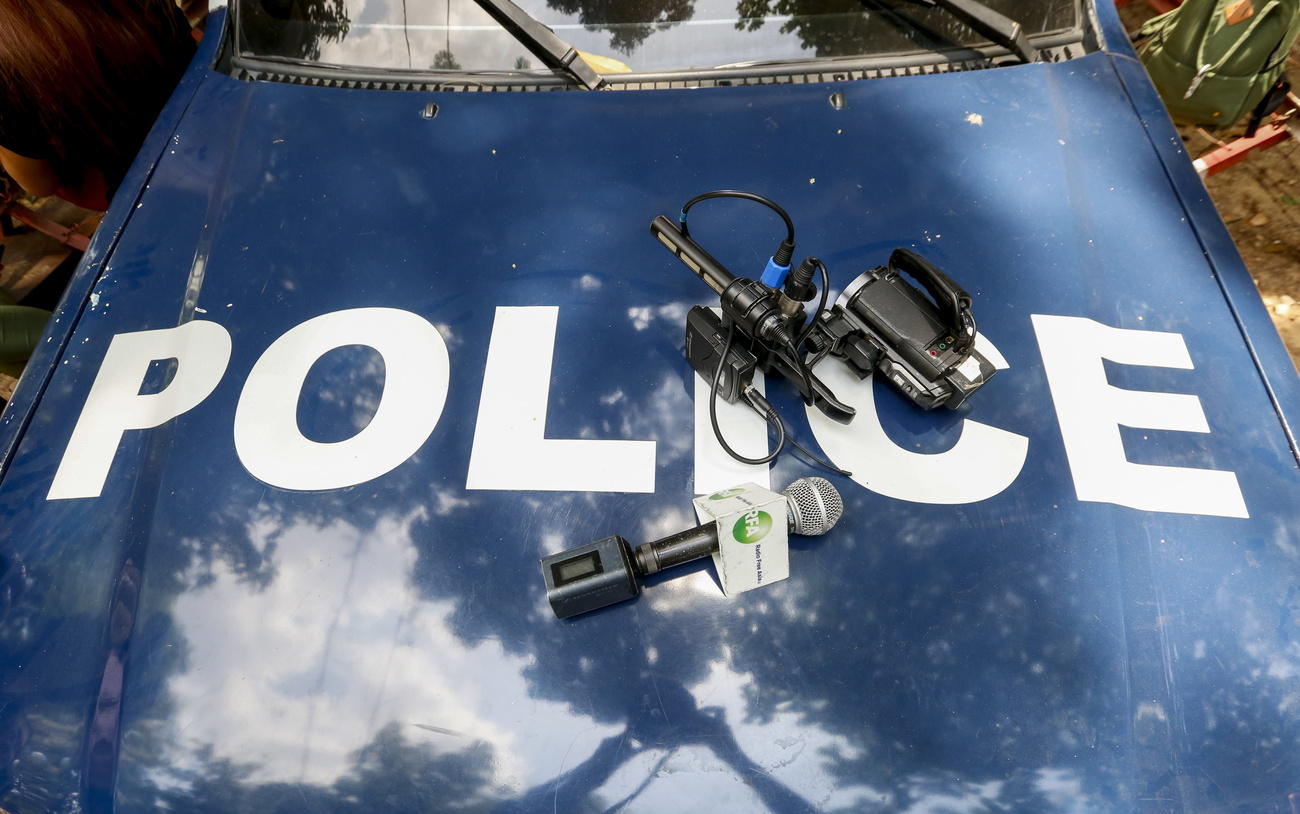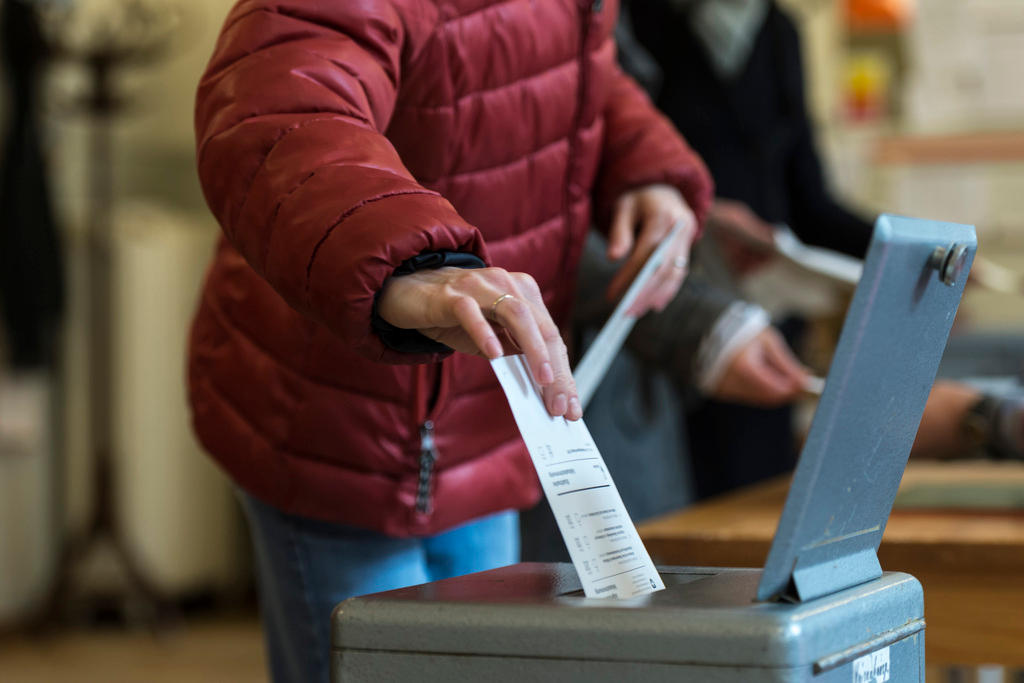How like-minded countries can collaborate in the fight against political disinformation
International cooperation is essential for countering the threat that disinformation poses to democracies, argues the deputy head of mission at the British embassy in Switzerland.
The recent International Day of Democracy invited reflection – both on the durability of the United Kingdom and Switzerland’s centuries of democratic traditions and on emerging threats to liberal democracies. One such threat is disinformation: the deliberate creation of false information with the intention to deceive or mislead audiences. Disinformation undermines our democratic values and subverts debate. It threatens the liberal and democratic foundations on which civil society institutions, the free media and internet companies all rely.
An old problem amplified by modern tools
Disinformation is not new. In 1923, Stalin set up a special office of dezinformatsiya. But we are living through a communications revolution that has democratised and accelerated the spread of information. In the process, our traditional media outlets have ceded ground, influence and readers to unmoderated online chambers of social discourse. And some have chipped away at the truth, at the strength of our democracy and the cohesion of our societies.
At a series of events in Bern last week (see infobox), an external expert spoke of new trends in computational propaganda: automated accounts designed to mimic human behaviour to amplify junk content and opinions on the political fringes and data-rich personalisation, which involves buying ads and deploying analytics to target citizens with posts to suppress voter turnout, among other aims. Other techniques are also rife, such as algorithmic amplification of conspiracy, propaganda and disinformation about political parties or issues and patriotic trolling – paid political commentators who harass political dissidents or opponents.
Governments across Europe have been subjected to disinformation, sown mostly on distant computers, by those intent on fanning discord and division within our societies. We know that certain states routinely use disinformation as a foreign policy tool. There are countless examples of how hostile states have spread false or manipulated information to people around the world, to destabilise their perceived enemies and disguise their own actions. Specious narratives on the use of chemical weapons in Syria, for example, have risked undermining the credibility of the rules-based international system. While some countries block access to the internet to prevent criticism, others who lack the capacity to do this attempt instead to saturate online media with pro-government propaganda.
Joining forces
The UK’s domestic policy response focuses on four key areas: more research to better understand the scale, scope and impact of disinformation; increasing public resilience to disinformation by raising awareness through media literacy; improving transparency and accountability in the online environment where information is shared; and considering whether we have the right regulation in place.
In April we announced world-leading proposalsExternal link for a comprehensive regulatory framework to tackle a range of online harms, including disinformation. We will establish in law a new duty of care on tech companies towards their users, overseen by an independent regulator. We are committed to designing a framework that keeps people safe, while ensuring people can freely communicate and access information online.
We will ensure freedom of expression is at the heart of our approach. An independent regulator would have to pay due regard to freedom of expression and privacy before taking any action. The UK supports freedom of expression, both as a fundamental right in itself and as an essential enabler of the full range of other human rights protected by UK and international law. We recently concluded a public consultation on our proposals and will continue to engage with a range of stakeholders on this issue.

More
Press freedom becomes a test case for Swiss foreign policy
At the first Global Conference for Media FreedomExternal link, held in London in July, we generated a coalition of countries in defence of media freedom. Switzerland joined us and others to sign a Global Pledge. In the publication of its priorities for next week’s 74th session of the United Nations General Assembly in New York, it was encouraging to hear of Switzerland’s open intent to play an active role in the Group of Friends for the Protection of Journalists. We are soliciting donations from countries worldwide for a Global Media Defence Fund, to be administered by UNESCO, which will support journalists to access legal advice and training on safety and investigative journalism.
Internationally, the UK is investing over CHF125 million ($126 million) in countering disinformation. This work includes providing important capacity-building support to independent media. One of the best antidotes to disinformation is a robust, free, vibrant and varied media landscape – a news environment where accurate content can prevail and high-quality online news has a sustainable future. We are increasing our work with international partners, such as Switzerland, plus academia and civil society, to detect, disrupt, dilute and expose disinformation, and to create a coherent platform for like-minded nations.
The recently-published AVIS28 VisionExternal link, a framework for defining Switzerland’s future foreign policy, proposes Switzerland’s leadership through International Geneva for governance in relation to digital transformation. As a country with a strong stake in the rules-based international order, Switzerland can play a role in defence of media freedom and cybersecurity.
Recent events around disinformation
In the week leading up to the International Day of Democracy, the UK and Canadian embassies in Bern co-hosted a series of events to enhance understanding and build platforms for cooperation to counter political disinformation. This included engagement with NATO partners, discussions with the Swiss government, and a public panel discussion with swissinfo.ch.
These events followed the UK and Canada’s co-hosting of the first- ever Global Conference for Media Freedom in London in July, which secured support to shine a spotlight on media freedom and to increase the cost to those governments and actors who abuse it.

In compliance with the JTI standards
More: SWI swissinfo.ch certified by the Journalism Trust Initiative


You can find an overview of ongoing debates with our journalists here. Please join us!
If you want to start a conversation about a topic raised in this article or want to report factual errors, email us at english@swissinfo.ch.